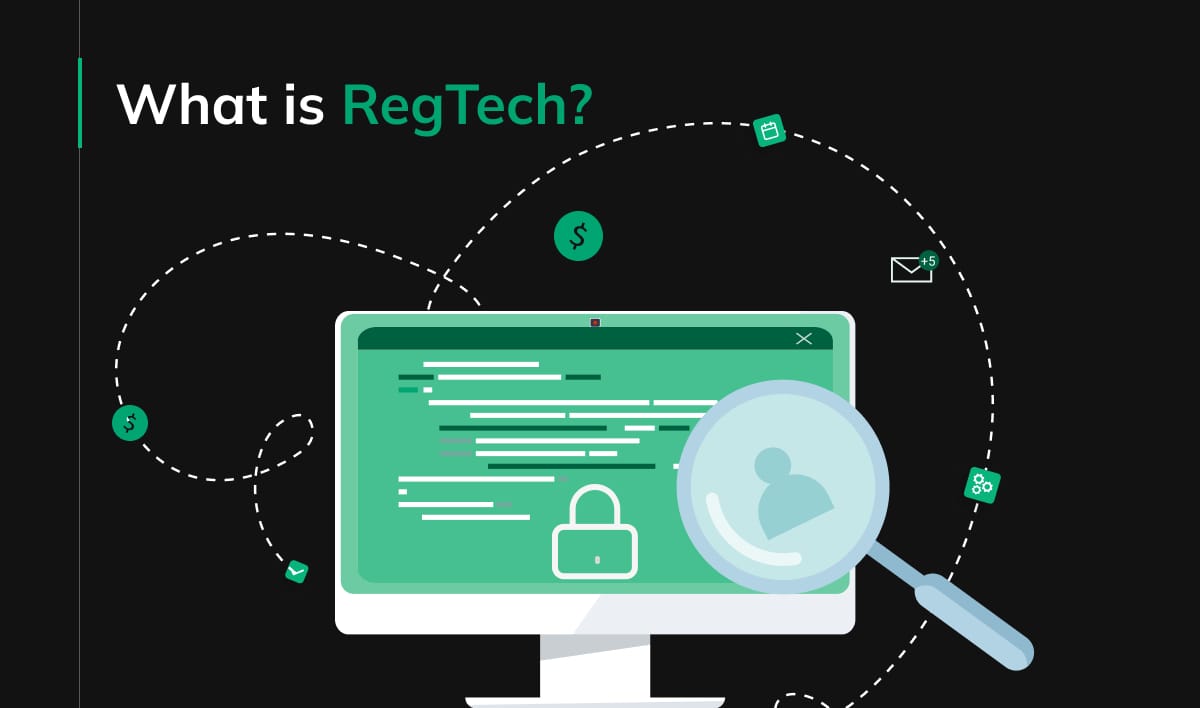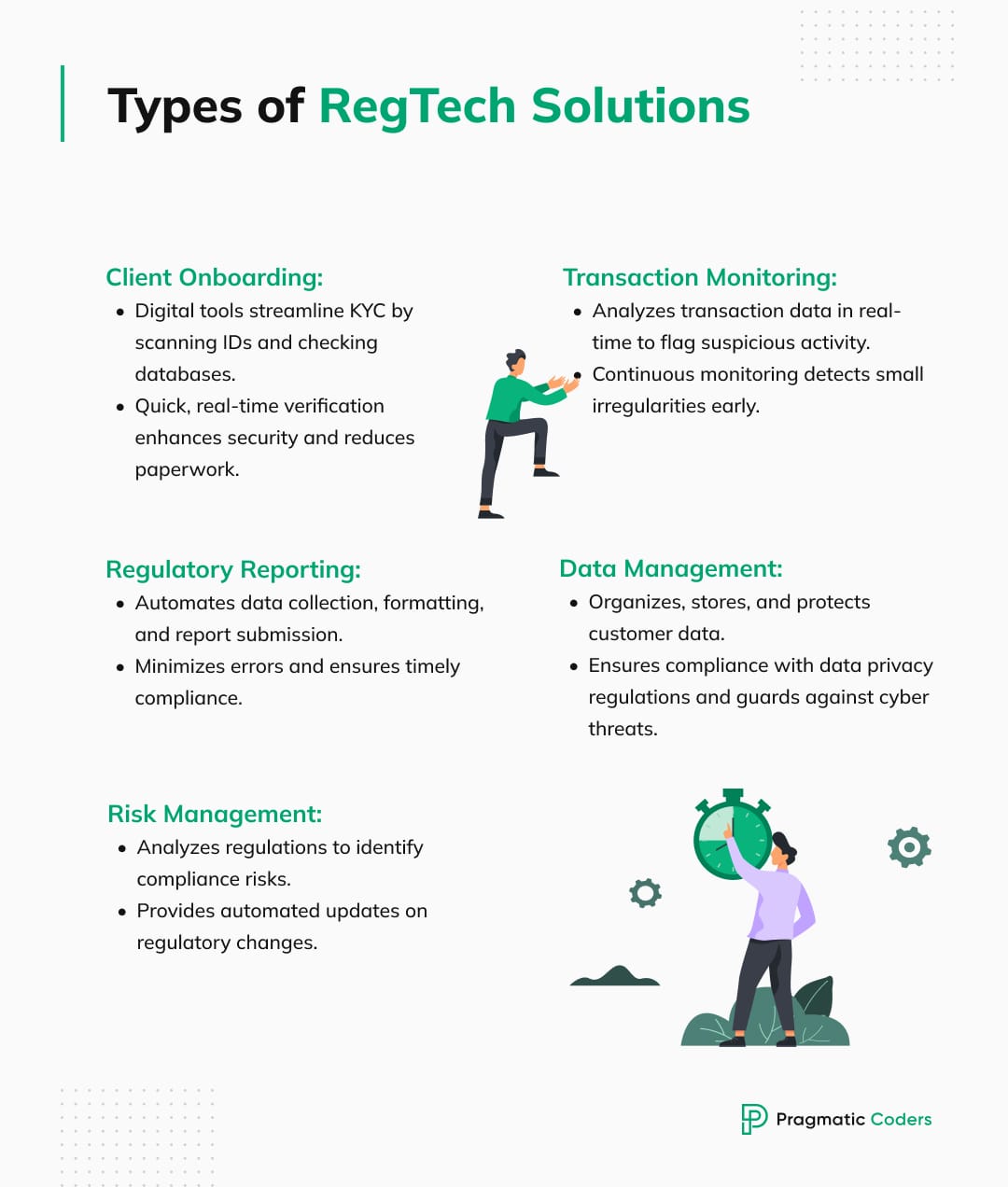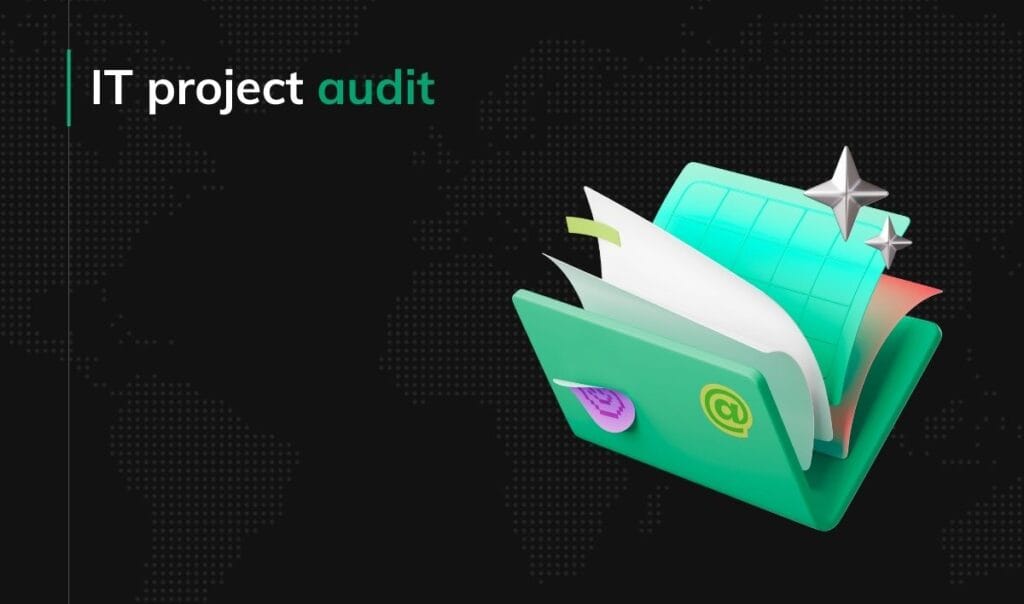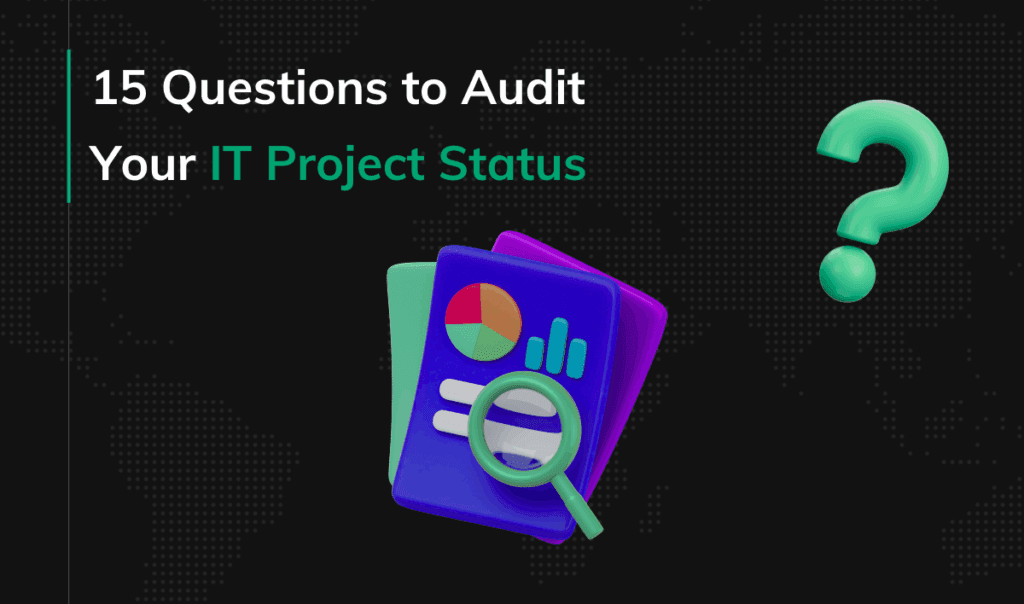What is RegTech? Regulatory Technology Explained

If you’re running a financial business, you know full well that regulations tend to evolve over time—often rapidly. Keeping up with this ever-changing set of rules can feel overwhelming. When you add the challenges the banking industry is currently facing, early retirement becomes very appealing, let’s just say. But there’s good news! A new wave of technology is here to help: RegTech.
RegTech, short for Regulatory Technology, is a game-changer for companies struggling with the regulatory process. It provides a toolbox of software solutions designed to make managing regulations easier and faster. Think of it as your digital guide through the maze of compliance.
In this article, we’ll explain what RegTech is, how it works, and the benefits it can bring to your business. We’ll also explore some potential challenges you might encounter during its implementation. Without further ado, let’s dive straight in:
Key Points
|
RegTech and FinTech: The Difference
We mentioned that RegTech is all about using technology to manage regulations. But what does that mean?
Regulatory Technology, or RegTech, is a type of software designed to help companies easily understand and follow the rules they need to comply with. These tools simplify and enhance the accuracy of staying compliant. Imagine mountains of paperwork, endless checklists, and spreadsheets galore. RegTech swoops in and streamlines all that.
- For example, if you run a bank, you must ensure every customer meets certain requirements to prevent fraud. RegTech providers can help automate these checks, freeing your compliance team from the burden of constant manual monitoring.
Such technological solutions aren’t brand new, but they are definitely having a moment. Their rise goes hand-in-hand with the boom in FinTech and the financial industry as a whole.
Financial Technology, or FinTech, refers to software and other technologies designed to automate and improve financial services. FinTech includes applications like mobile banking, peer-to-peer payments, and cryptocurrency, making financial operations more efficient and accessible for businesses and consumers alike. Remember those cool apps that let you manage your money on your phone? That’s FinTech.
Now, the key difference between the two:
- FinTech is all about making financial services faster and easier for customers. RegTech, on the other hand, focuses on helping financial institutions comply with the law.
While they have different objectives, the RegTech and FinTech industries are interconnected. Some companies even collaborate to create a seamless experience.
Why Should You Use RegTech?
Remember the days when keeping up with regulatory requirements felt manageable? Yeah, those were simpler times. Today, new regulatory updates are emerging at a breakneck pace. This isn’t just a headache for FinTechs – it applies to all kinds of businesses, from healthcare, through AI (the AI Act), to blockchain and crypto (MiCA regulation is already in full swing!).
Here’s why this regulatory explosion is happening:
- Stricter Regulatory Bodies: Regulatory bodies are getting stricter. They want to ensure businesses comply with regulations and protect consumers. Consider significant consumer protection acts like Dodd-Frank in the US (aimed at preventing another financial crisis) or GDPR in Europe (focusing on data privacy). These are just a few examples, and there are many more depending on your industry.
- Global Connectivity: The world is more connected than ever. Businesses operate across borders, which means they need to comply with a mix of regulations. This complicates the compliance process, to say the least.
The 2008 financial crisis is a prime example of what happens when things go wrong. Weak regulations led to risky practices, and everyone felt the pain. Since then, regulators have stepped up their game, and businesses need to do the same. This is where RegTech comes in. It offers the solutions businesses require to navigate the complex landscape of regulations.
The Technologies Behind RegTech
So, RegTech sounds pretty cool, but how does it actually work? Let’s explore the modern technologies that fuel RegTech and make it a game-changer in the finance industry:
- Artificial Intelligence (AI) and Machine Learning (ML): Picture a super-smart assistant that can scan mountains of data and identify potential compliance risks. That’s the magic of AI and ML for fraud detection. They can analyze complex regulations, flag suspicious actions, and even predict future compliance challenges. On a side note, the uses of AI in FinTech and RegTech don’t stop here—not even close.
- Big Data: RegTech uses big data to store and manage regulatory information. Think of it as a powerful search engine for regulations, allowing businesses to easily access and understand the rules they are required to follow. This information is also analyzed with data science technologies to gather insights.
- Cloud Computing: Cloud computing makes RegTech accessible and affordable for businesses of all sizes. Storing all your compliance tools online and making them accessible from anywhere greatly reduces operating costs.

Let’s see examples of how these technologies work together in real life:
- Chainalysis: An AI-powered AML RegTech solution. Chainalysis specializes in blockchain analysis, focusing on identifying suspicious activity in cryptocurrency transactions. Their software helps banks and other financial institutions adhere to Anti-Money Laundering (AML) regulations by identifying transactions that could be linked to criminal activity. By leveraging AI and machine learning, Chainalysis analyzes large volumes of transaction data to identify patterns that may indicate money laundering.
- Unit21: A cloud-based RegTech platform for regulatory reporting. Many financial institutions find complex regulatory paperwork challenging. Platforms like Unit21 offer cloud-based solutions that automate this process. By connecting to a bank’s internal systems, these platforms collect data and automatically generate reports in the required format. Some can even submit reports electronically to regulators, significantly improving efficiency and minimizing the risk of errors and missed deadlines.
The Benefits of RegTech
Ensuring compliance – it’s not exactly the most exciting part of running a financial business. But let’s face it, ignoring regulations can lead to hefty fines and even shutdowns. That’s where RegTech industry comes in, offering solutions that make compliance less of a chore and more of a strategic advantage.
Here’s how RegTech can help you navigate the regulatory landscape:
- Slashing Costs and Streamlining Processes: RegTech automates repetitive tasks like data entry and report generation. This frees up your team’s time and resources, allowing them to focus on higher-value activities. Plus, you save money on manual labor and reduce potential errors.
- Spotting Trouble Before it Starts: RegTech uses AI and machine learning to analyze vast amounts of data in real-time, allowing you to identify issues before they snowball into major problems. Such proactive risk management is key to staying ahead of the curve.
- Building a Fortress Against Fraud: Fraudsters are always getting craftier, but RegTech is here to fight back. AI-powered solutions can detect suspicious behavior with superhuman precision, helping to prevent financial losses and protect your business reputation.
Types of RegTech Solutions
We’ve talked about the benefits of RegTech, but what exactly can these solutions do? Here’s a breakdown of some core features that make RegTech a game-changer:
- Client Onboarding: Traditionally, verifying customer identities (KYC) involved a lot of paperwork. RegTech steps in with digital tools that can scan IDs, check databases, and streamline the process. Imagine a smooth sign-up experience for your customers and less busywork for your team. Such tools can quickly detect fraudulent documents and provide real-time verification, enhancing both security and efficiency.
- Transaction Monitoring: These tools can analyze huge amounts of transaction data in real-time, flagging anything suspicious that might indicate money laundering or fraud. Think of it as a guard dog for your business finances, keeping you safe from bad actors. Continuous monitoring ensures that even the smallest irregularities are detected early, preventing potential large-scale issues.
- Regulatory Reporting: RegTech can also automate a lot of the grunt work involved in regulatory reporting. The tech can collect the data, format it correctly, and even submit the reports directly. This frees up your team’s time for more important tasks. Automated reporting minimizes human errors and ensures timely compliance, reducing the risk of penalties.
- Data Management: Data security is a huge concern for any business. RegTech offers tools to help you organize, store, and protect all your customer data. These tools can also help ensure you’re complying with data privacy regulations and protect your sensitive information against cyber threats.
- Risk Management: Compliance regulations are constantly changing, and it can be tough to keep up. RegTech software can analyze regulations and identify areas where your business might be at risk. This way, you can proactively address any potential issues and avoid hefty fines. These solutions often include automated updates on regulatory changes, keeping your business informed and compliant.

Examples of RegTech Firms
We’ve already mentioned two RegTech companies — Chainalysis and Unit21. However, the more examples, the better! Here are a few more industry leaders you should know:
- ComplyAdvantage: ComplyAdvantage specializes in AML (anti-money laundering) and KYC (know-your-customer) solutions. Their AI-powered platform tackles everything from verifying customer identities to screening for sanctions and flagging suspicious activity. It’s a one-stop shop for keeping your business safe from fraudulent activities.
- Actico: Actico helps firms follow the ever-changing financial regulations. They offer a comprehensive suite of solutions, from managing regulatory change to streamlining transaction monitoring. Their cloud-based platform makes RegTech accessible and affordable for everyone.
- MetricStream: MetricStream is an industry leader providing a toolbox for managing all compliance-related topics. Their solutions cover everything from risk management to reporting. Partnering with them is like contracting a team of compliance experts to automate tasks and ensure accuracy.
If you’d like to discover even more interesting FinTech and RegTech firms, our guide to the top 15 fresh FinTech startups will be just up your alley!
Implementing RegTech: Considerations
So far so good, right? But before you jump into RegTech headfirst, there are a few things to keep in mind. Here, we’ll cover some practical considerations.
- Infrastructure Requirements: Not all RegTech tools are created equal. Make sure you have the technical infrastructure to support the new software. You might need some IT upgrades to ensure smooth sailing. Think of it as making sure your computer can handle a new game before you buy it.
- Preparing Employees for RegTech Adoption: New technology means change, and some people might resist it. Get your team on board by explaining how RegTech will make their lives easier, not harder. Training and clear communication are key.
- Data Security: Security is essential when dealing with sensitive data. Choose a solution with robust security features and a proven track record of data protection. Remember, data breaches are bad for business.
- Ensuring Effective Integration: Will the new risk and compliance solution work well with your existing compliance systems? Look for technology solutions that integrate seamlessly to avoid creating IT headaches. Imagine riding a car with four differently-sized tires – not a recipe for success!
The Future of RegTech Solutions
RegTech is no passing fad – it’s here to stay! The future of RegTech is fueled by cutting-edge technology and a growing need for smarter compliance solutions. Here’s a sneak peek at what’s on the horizon:
- New Technologies Enhancing RegTech: Expect to see even more powerful technologies like AI and big data playing a significant role in RegTech. Imagine AI that can not only identify compliance risks but also predict regulatory updates.
- The Advancement of Automation: Repetitive tasks will become a thing of the past as RegTech solutions become even more automated. This will enable your teams to focus on strategic initiatives and higher-value work, significantly boosting productivity.
- RegTech Across Diverse Industries: While RegTech is booming in finance, its potential extends far beyond. Expect to see RegTech solutions in many different industries, from healthcare to manufacturing. No matter your business, RegTech will help you stay compliant with evolving laws.
Conclusion
RegTech is a game-changer in ensuring regulatory compliance, utilizing advanced technologies such as AI, big data, and cloud computing. These solutions automate compliance processes, reduce costs, and enhance efficiency. This is crucial as firms face increasingly complex regulatory challenges in a rapidly changing global market. For businesses aiming to stay competitive, adopting such technologies is essential. These tools not only improve compliance with current regulations but also prepare firms for future changes.







